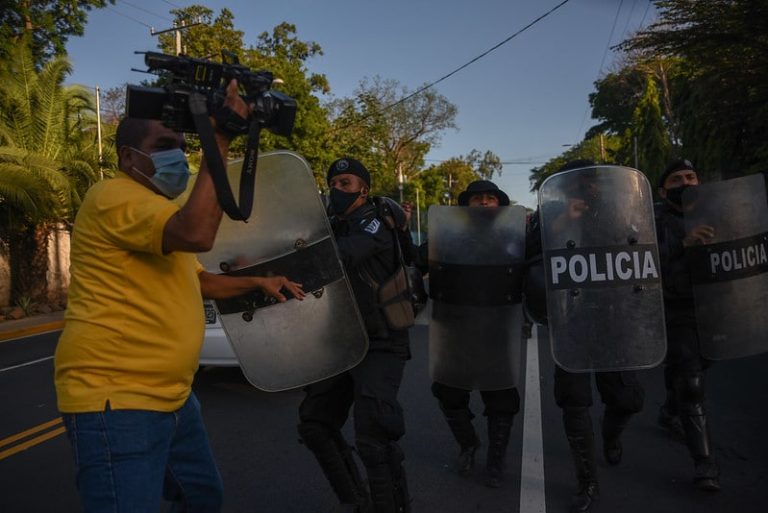30 de abril 2022

Children of Exile: The Births “Sowing Hope” in the Camp of Nicaraguan Farmers

PUBLICIDAD 1M
PUBLICIDAD 4D
PUBLICIDAD 5D
Carlos Fernando Chamorro urges journalists to keep Nicaragua’s sociopolitical crisis on the international agenda

The exercise of free press and free expression have become ever more difficult in Latin America. Authoritarian regimes and organized crime are attempting to silence the independent media in order to keep citizens misinformed. That was the warning of notable journalists during a forum entitled “Press Freedom in the Americas”, sponsored by the Interamerican Institute for Democracy, part of Florida International University.
“The problems of the free press are urgent across the Americas. The panorama before us is desolate,” described Ricardo Trotti, director of the Interamerican Press Society.
The group observed with concern the ongoing murders, imprisonments, and restrictions to journalists’ fundamental rights in countries such as Mexico, Nicaragua, Venezuela, and Cuba. Nonetheless, they also warned about the negative repercussions of government rhetoric against the independent media in a number of these and other countries across the region.
“We’re not speaking about easy times for journalists; we’re in one of the [profession’s] most difficult and challenging moments,” noted Pedro Vaca, Special Rapporteur for Free Expression with the Inter-American Commission for Human Rights. However, in part due to this negative atmosphere, “the journalist community in the Americas is resilient,” he stressed.
As Vaca sees it, there’s “a regressive context for freedoms on the continent.” This is manifested via “censorship by stigmatizing and censorship by repressive regimes.” Closely related to all this is the fact that: “democracy can’t survive without information, without journalism,” he added.
In the case of Nicaragua, Confidencial director Carlos Fernando Chamorro indicated that there currently exists “dual criminalization” of the exercise of journalism: the Ortega regime persecutes and jails both the reporters who inform, and also their sources of information. Nonetheless, amid the sociopolitical crisis the country is going through, the independent press continues committed to truth, steadfastly refusing to accept censorship or self-censorship.
“We [journalists] continue informing, although today we no longer have sources we can cite in Nicaragua, because informing and offering opinions under a totalitarian regime is a crime paid for with jail time,” Chamorro explained. “Those sentenced in the jails are there for expressing opinions, for posting opinions on social media and for having offered declarations to the national and international media,” he added.
Faced with this hostile scenario in Nicaragua, journalists today practice “collaborative reporting”. Their greatest challenge continues to be “carrying out high-quality investigative journalism amid a climate of threats and political polarization,” Chamorro pointed out. “The only thing that defends us from the totalitarian state and the government slander is our audience’s recognition of our credibility.”
Chamorro urged the international press to keep the Nicaraguan crisis on the agenda of public opinion in Latin America, since he believes: “It’s a long-term crisis and a complex process of civic resistance,” to find a way out of the dictatorship. The challenge for Nicaraguan journalists and the international press is “not to accept the normalization of the dictatorship, and continue informing,” Chamorro concluded.
Meanwhile, Mexican journalist Martha Ramos, president of the Mexican Media Alliance, expressed that in her country, “the climate of decomposition is evident.” She noted as “a determining factor” the fact that “the State powers attack journalists.”
In just four months of 2022, eight journalists have been murdered in Mexico. In Ramos’ view, “the mocking tone” President Andres Manuel Lopez Obrador has employed against the independent press during his daily press briefings makes it appear “like the journalists are an enemy to be beaten. He puts us in a very vulnerable situation,” she underlined.
Journalist Jorge Ramos of the US based Univision network, also denounced the attitude of President Lopez Obrador. He has created “an environment hostile to independent journalism. The danger of all this can be seen in the present situation, in which [Mexico has become] one of the most dangerous countries in the world for the exercise of journalism.”
Robert Rock is vice president of the Mexican Media Alliance and a former board member of the International Press Society. He believes that all over the region, governments “have in their hands ever more sophisticated mechanisms” to weaken press freedom. “They’re no longer governments that jail journalists, that burn newspapers, it’s something more sophisticated,” he specified.
There’s a very pronounced tendency among the Latin American governments to deliver “polarizing speeches of confrontation, not only against the media but against any of the leading figures that could serve as a counterweight,” Rock warned. This rhetoric “has more subtle, but equally damaging repercussions,” he affirmed.
This article was originally published in Spanish in Confidencial and translated by Havana Times
PUBLICIDAD 3M
Confidencial es un diario digital nicaragüense, de formato multimedia, fundado por Carlos F. Chamorro en junio de 1996. Inició como un semanario impreso y hoy es un medio de referencia regional con información, análisis, entrevistas, perfiles, reportajes e investigaciones sobre Nicaragua, informando desde el exilio por la persecución política de la dictadura de Daniel Ortega y Rosario Murillo.
PUBLICIDAD 3D